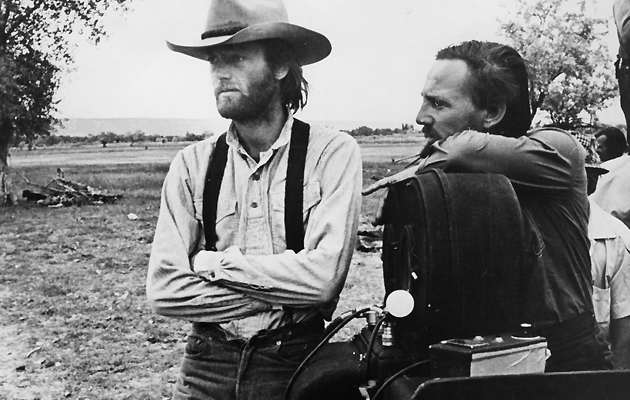Subscribe to Uncut and make huge savings on the cover price – find out by clicking here!
In memory of Peter Fonda, who died on August 16, 2019; this was originally published in Uncut’s January 2002 issue (Take 52)
RETURN OF THE WILD ANGEL
Two years after he became a counterculture star with Easy Rider, PETER FONDA made his directorial debut with a lyrical western, THE HIRED HAND, as a newly restored version opens in the UK this month, he talks to Damien Love
Synchronicity they call it. Shortly before I’m due to speak with Peter Fonda, I flick on the TV, and there’s his father, Henry – “Hollywood’s statue of liberty,” to borrow David Thomson’s phrase – standing in a black-and-white hotel corridor, speaking with a gathering of Runyonesque Times Square natives, that unmistakable voice kept low, a sound as gentle as a warm breeze, but carrying echoes of broken glass.
His children inherited traces of that cadence along with their bone structure. It’s still there, faintly, when I ask the 61-year-old Peter Fonda how he’s doing, and he says, “I’m pretty good. I’m alive. People think I’m cynical when I say that, but it’s the only way to start the day. And the best way to finish it.”
The film on my TV is an almost-forgotten thing called The Big Street, released late in 1942, when Peter Fonda was just shy of his third birthday, just before his father would disappear from the house and go off to fight a war.
Fonda remembers the movie. He remembers going to watch his father’s films in movie theatres back then as a little kid. Seeing his dad up on cinema screens during that period, in films about cowboys and circuses and rum doings in New York City, the boy would get confused. His dad was supposed to be away fighting the Japanese, after all. Eventually, he decided the man on the movie screen wasn’t his dad at all. He just looked like him. Then he’d get freaked out when his dad came home on leave, because he didn’t look like his dad – he looked like the man from the movies.
This was the earliest manifestation of an awkward distance between father and son which, as anyone familiar with his consistently entertaining memoir Don’t Tell Dad will be aware, would come to be a defining characteristic in their relationship, and which the younger Fonda spent many years breaking down.
In The Big Street, anyway, the man who looks like Henry Fonda plays a decent, lovelorn busboy who pushes a bitter, semi-crazy Lucille Ball in a wheelchair from Manhattan to Miami. What really strikes me as I watch a few scenes on TV, though, is that it also features Agnes Moorehead and Ray Collins, both members of the Mercury Theatre stock company Orson Welles brought to Hollywood, and that it was made when members of Welles’ contingent were being given a particularly rough ride.
Seen as East Coast longhairs, an invading bohemian force come to overthrow the system, there had been not-so-private jubilation among sectors of the Hollywood establishment when Citizen Kane (1941) stiffed at the box-office. Taken from him and recut, Welles’s second picture, The Magnificent Ambersons (1942) was given only a desultory release by a studio that didn’t care about it, buried. Just off of that film, with their Mercury unit shut down by the RKO studio, as they talk with Henry Fonda in The Big Street, Moorehead and Collins are beaten refugee fighters from a failed revolution.
Twenty-seven years would pass before Hollywood had to deal with another longhair revolution. When it came, it was an attack from within, prodigal sons coming home to kill their elders. Peter Fonda – the Statue of Liberty’s kid, goddamn it – and Dennis Hopper, the ungrateful little punk who’d married Margaret Sullavan’s daughter and been a long-term houseguest of David O Selznick and Jennifer Jones, made this foul hippy thing called Easy Rider…
But you know all about that. How the film was no Citizen Kane, but became a box office sensation in a way Welles’ movie never did. How Peter Fonda’s Captain America seemed to represent something for a generation the same way that, out along different highways, his father’s Tom Joad once had for a generation before. How it made back its $400,000 budget 100 times over. And how, even if they didn’t get the dirt, the drugs, the hair and the music, studio chiefs understood those numbers and scrambled in fright to mine this incomprehensible new “youth market”.



